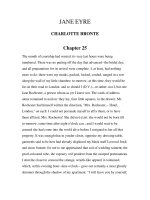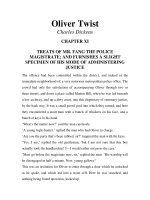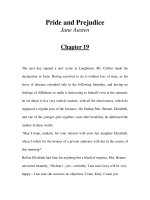LUYỆN ĐỌC TIẾNG ANH QUA TÁC PHẨM VĂN HỌC-SHORT STORY BY O’HENRY -The Higher Pragmatism
Bạn đang xem bản rút gọn của tài liệu. Xem và tải ngay bản đầy đủ của tài liệu tại đây (28.7 KB, 13 trang )
SHORT STORY BY O’HENRY
The Higher Pragmatism
I
Where to go for wisdom has become a question of serious import. The
ancients are discredited; Plato is boiler-plate; Aristotle is tottering; Marcus
Aurelius is reeling; Aesop has been copyrighted by Indiana; Solomon is too
solemn; you couldn't get anything out of Epictetus with a pick.
The ant, which for many years served as a model of intelligence and industry
in the school-readers, has been proven to be a doddering idiot and a waster
of time and effort. The owl to-day is hooted at. Chautauqua conventions
have abandoned culture and adopted diabolo. Graybeards give glowing
testimonials to the venders of patent hair- restorers. There are typographical
errors in the almanacs published by the daily newspapers. College professors
have become--
But there shall be no personalities. To sit in classes, to delve into the
encyclopedia or the past-performances page, will not make us wise. As the
poet says, "Knowledge comes, but wisdom lingers." Wisdom is dew, which,
while we know it not, soaks into us, refreshes us, and makes us grow.
Knowledge is a strong stream of water turned on us through a hose. It
disturbs our roots.
Then, let us rather gather wisdom. But how to do so requires knowledge. If
we know a thing, we know it; but very often we are not wise to it that we are
wise, and--
But let's go on with the story.
II
Once upon a time I found a ten-cent magazine lying on a bench in a little
city park. Anyhow, that was the amount he asked me for when I sat on the
bench next to him. He was a musty, dingy, and tattered magazine, with some
queer stories bound in him, I was sure. He turned out to be a scrap-book.
"I am a newspaper reporter," I said to him, to try him. "I have been detailed
to write up some of the experiences of the unfortunate ones who spend their
evenings in this park. May I ask you to what you attribute your downfall in--
"
I was interrupted by a laugh from my purchase--a laugh so rusty and
unpractised that I was sure it had been his first for many a day.
"Oh, no, no," said he. "You ain't a reporter. Reporters don't talk that way.
They pretend to be one of us, and say they've just got in on the blind
baggage from St. Louis. I can tell a reporter on sight. Us park bums get to be
fine judges of human nature. We sit here all day and watch the people go by.
I can size up anybody who walks past my bench in a way that would surprise
you."
"Well," I said, "go on and tell me. How do you size me up?"
"I should say," said the student of human nature with unpardonable
hesitation, "that you was, say, in the contracting business--or maybe worked
in a store--or was a sign-painter. You stopped in the park to finish your
cigar, and thought you'd get a little free monologue out of me. Still, you
might be a plasterer or a lawyer--it's getting kind of dark, you see. And your
wife won't let you smoke at home."
I frowned gloomily.
"But, judging again," went on the reader of men, "I'd say you ain't got a
wife."
"No," said I, rising restlessly. "No, no, no, I ain't. But I will have, by the
arrows of Cupid! That is, if--"
My voice must have trailed away and muffled itself in uncertainty and
despair.
"I see you have a story yourself," said the dusty vagrant--impudently, it
seemed to me. "Suppose you take your dime back and spin your yarn for me.
I'm interested myself in the ups and downs of unfortunate ones who spend
their evenings in the park."
Somehow, that amused me. I looked at the frowsy derelict with more
interest. I did have a story. Why not tell it to him? I had told none of my
friends. I had always been a reserved and bottled-up man. It was psychical
timidity or sensitiveness-perhaps both. And I smiled to myself in wonder
when I felt an impulse to confide in this stranger and vagabond.
"Jack," said I.
"Mack," said he.
"Mack," said I, "I'll tell you."
"Do you want the dime back in advance ?" said he.
I handed him a dollar.
"The dime," said I, "was the price of listening to your story."
"Right on the point of the jaw," said he. "Go on."
And then, incredible as it may seem to the lovers in the world who confide
their sorrows only to the night wind and the gibbous moon, I laid bare my
secret to that wreck of all things that you would have supposed to be in
sympathy with love.
I told him of the days and weeks and months that I had spent in adoring
Mildred Telfair. I spoke of my despair, my grievous days and wakeful
nights, my dwindling hopes and distress of mind. I even pictured to this
night-prowler her beauty and dignity, the great sway she had in society, and
the magnificence of her life as the elder daughter of an ancient race whose
pride overbalanced the dollars of the city's millionaires.
"Why don't you cop the lady out?" asked Mack, bringing me down to earth
and dialect again.
I explained to him that my worth was so small, my income so minute, and
my fears so large that I hadn't the courage to speak to her of my worship. I
told him that in her presence I could only blush and stammer, and that she
looked upon me with a wonderful, maddening smile of amusement.
"She kind of moves in the professional class, don't she?" asked Mack.
"The Telfair family--" I began, haughtily.
"I mean professional beauty," said my hearer.
"She is greatly and widely admired," I answered, cautiously.
"Any sisters?"
"One."
"You know any more girls?"
"Why, several," I answered. "And a few others."









